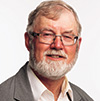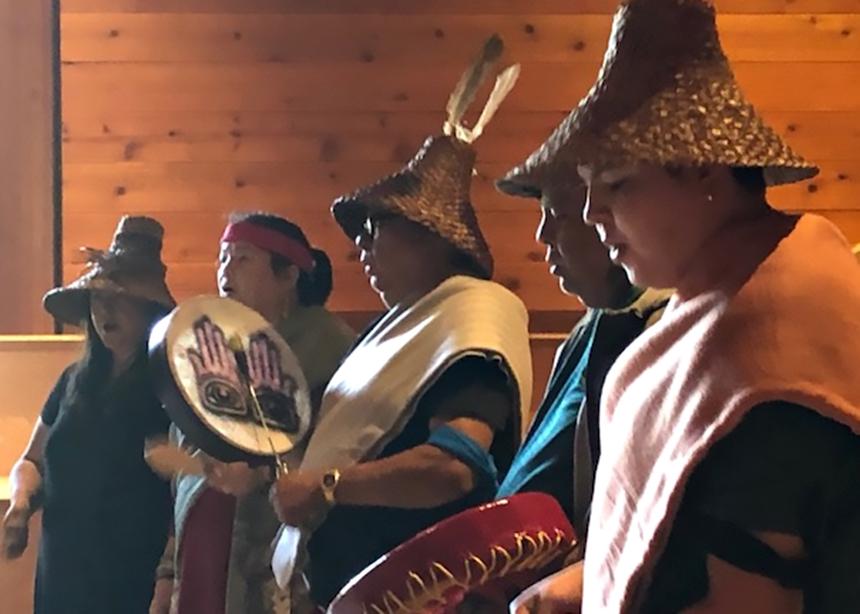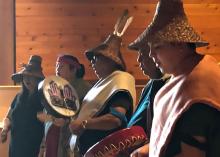The second event in a series of online discussions that Canadian Mennonite is hosting will take place on Zoom on Wednesday, Oct. 5 at 8 p.m. ET.
Hosted by Aaron Epp, CM’s online media manager, the discussion will explore Indigenous-settler relations and some of the concrete steps Canadian Mennonites are taking to further reconciliation.
We asked two of the guests who will be joining Epp—Doyle Wiebe and Allegra Friesen Epp—to write a few paragraphs introducing themselves and to identify a question they hope to bring to the discussion.
Niigaan Sinclair, a native studies professor at the University of Manitoba and a Winnipeg Free Press columnist, will also take part in the discussion on Oct. 5. You can register to attend at canadianmennonite.org/events.
Doyle Wiebe
 I am a fourth-generation farmer in Langham, Sask. The most public, intentional and ongoing way that I am expressing my wish to assist in reconciliation efforts is through the Treaty Land Sharing Network.
I am a fourth-generation farmer in Langham, Sask. The most public, intentional and ongoing way that I am expressing my wish to assist in reconciliation efforts is through the Treaty Land Sharing Network.
A farmer friend was part of the organizing group that first came together to find a way to counter the fallout from the Colten Boushie trial and verdict, in keeping with the language of the treaties about sharing the land. After many months of discussions with First Nation leaders, a website was developed identifying where a landowner is inviting Indigenous people to come on the land.
I have placed a sign on some land we own that has the best chance of having the kinds of plants and animals for harvesting food, medicines or for ceremonial purposes. It says, “Treaty Land Sharing Network, Indigenous people welcome.”
The land is registered on the network website along with my phone number to call—not to get permission because that is already understood, but to get the precise location and provide notice to avoid possible misunderstandings with neighbours. No vehicles or fires are allowed on the property and respect for growing crops, gates, etc., is expected. It can be the start of a relationship.
This is important to me because one of the conclusions I have come to after years of just watching our society devolve into an “us and them” mindset is that we as settler people stole the dignity of First Nations peoples and we need to find ways to give it back.
My question: How can we turn around the perception that non-Indigenous folks will lose something if we recognize what was stolen from Indigenous folks? How do we realize that we can all gain something by healing the relationship between Indigenous peoples and settlers?
Allegra Friesen Epp
 Reconciliation is important to me because I care about people and I care about justice. To this day, the Canadian government and settler society do not treat Indigenous peoples and nations with dignity and respect.
Reconciliation is important to me because I care about people and I care about justice. To this day, the Canadian government and settler society do not treat Indigenous peoples and nations with dignity and respect.
I am a settler on Turtle Island and the work of reconciliation, decolonization and solidarity is my responsibility. It is also my calling, as a Christian, to challenge systems of oppression and to actively work for peace.
I recently completed an internship with Mennonite Church Canada’s Indigenous-settler Relations office and Community Peacemaker Teams’ Turtle Island Solidarity Network.
The most transformative part of my internship was the work I did on the ground. Last year, I accompanied Indigenous land defenders in Wet’suwet’en territory. This is where I really began to understand what Indigenous self-determination and self-governance look like. This is where the atrocities of settler colonialism became particularly apparent to me as I witnessed Coastal GasLink—backed by Canadian government and military—lay pipe through Wet’suwet’en territory without consent.
In my hometown of Winnipeg, I organize with Manitoba Energy Justice Coalition, a grassroots group committed to climate justice and Indigenous sovereignty. We plan rallies, protests, sit-ins and other actions in solidarity with Indigenous-led movements.
I also co-chair the Mennonite Coalition for Indigenous Solidarity, a provincial working group of Mennonites from a diversity of urban and rural congregations who are seeking to bring our constituency into the spiritual and practical work of Indigenous-settler relations.
My question: Why is the work of reconciliation important to each of you?
Related stories:
CM hosts first discussion of new online series
Discussion event to explore the climate crisis



Comments
Thank you for the online discussion exploring Indigenous-settler reconciliation with Niigaan, Doyle and Allegra. While it had the ring of preaching to the choir, Niigaan put it into perspective. Few Mennonites are knowledgeable about the issue. Many have failed to internalize the issues involved enough to take concrete action.
I would add that not all Indigenous people are ready to engage in reconciliation with the settler population as well. The trauma, suspicion, and psychological pain is still too raw to trust any overtures from settlers towards reconciliation. Niigaan encouraged those who have done the hard and risky work needed to create the conditions for reconciliation are on the vanguard of a growing movement.
As I listened how Indigenous people are recovering their culture and identity, it occurred to me that Mennonites starting point for reconciliation is reconciling their settler privilege with their Anabaptist beliefs. This is a painful journey of self-examination, repentance and embrace of the practice demanded of people of the Jesus way as essential for genuine Indigenous-settler reconciliation to grow from symbolic acts such as land acknowledgements to solidarity with Indigenous people experiencing cultural, social and economic revitalization that benefits all of society. We take responsibility for the privileges we received as participants in Canada’s colonial project and immerse ourselves in God’s love and His particular concern for those who were born into the unjust circumstances of settler colonialism.
By listening to Indigenous voices, we become richer as we discover the face, body and spirit of the Creator and embrace our kinship with all of creation.
Add new comment
Canadian Mennonite invites comments and encourages constructive discussion about our content. Actual full names (first and last) are required. Comments are moderated and may be edited. They will not appear online until approved and will be posted during business hours. Some comments may be reproduced in print.